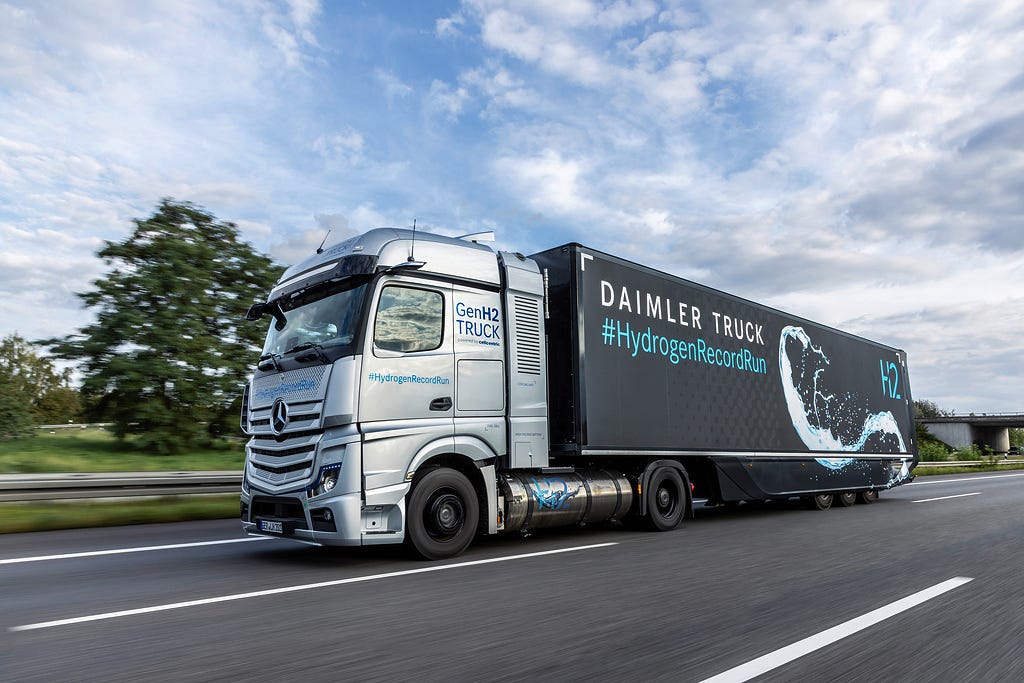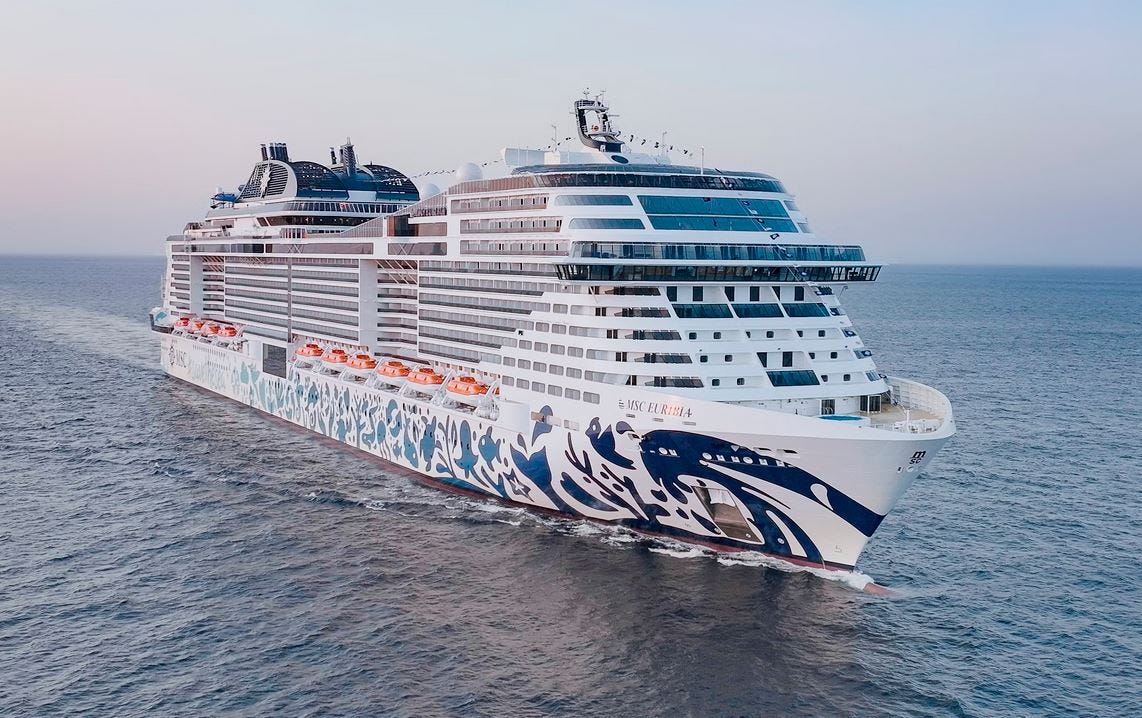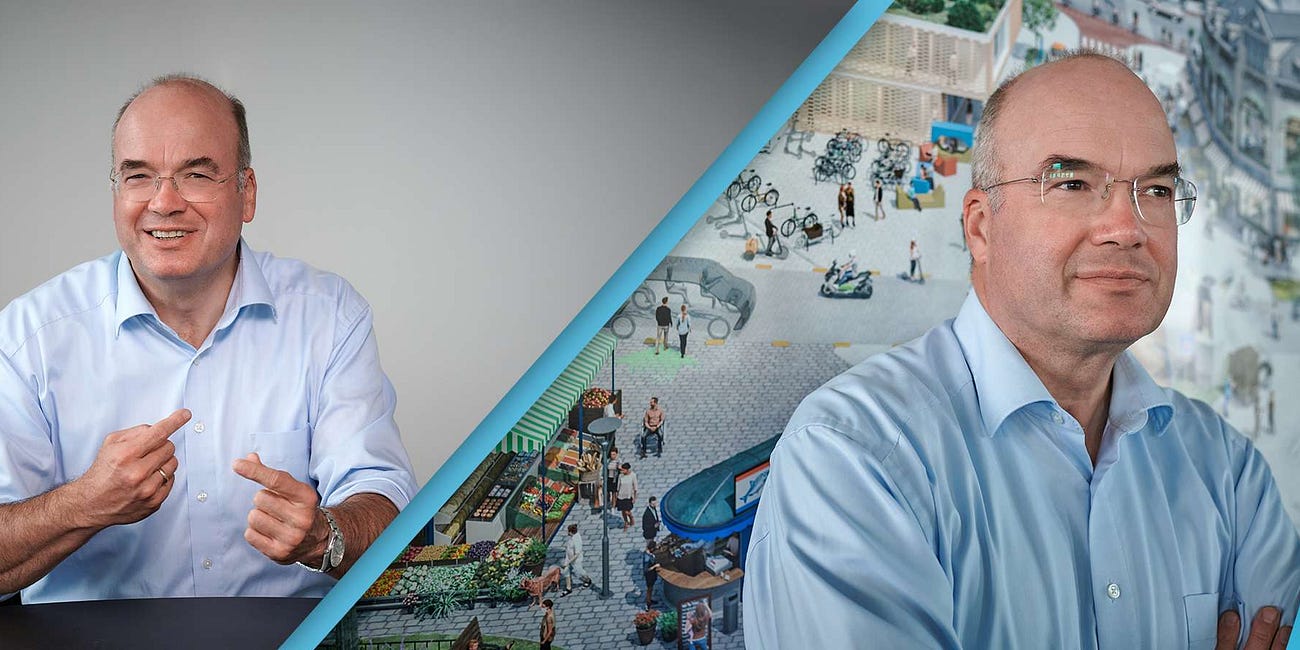H2 Newsletter 04.10.2023: A new truck that runs for 1000 km with hydrogen
Daimler has demonstrated that hydrogen is a viable alternative for trucks to reduce CO2 emissions – and a new cruise ship will get its power from fuel cells.
When it comes to the implementation of hydrogen in the economy, trucks are the most popular research subjects. In 2021, trucks transported 3.69 billion tons of goods in Germany. There is a lack of reliable information in the road freight sector worldwide. The 74 member states of the International Transport Forum (ITF) provide precise figures on land freight volumes. From 2010 to 2021, there was solid growth in transported freight, especially in emerging countries such as India and Uzbekistan - in the case of Kazakhstan, even around 50 percent. The use of hydrogen is therefore crucial.
Daimler Truck has set a new record with the Mercedes-Benz GenH2 truck, covering a distance of 1,000 kilometers on just one tank of liquid hydrogen. This achievement not only highlights the performance of the GenH2 truck but also underscores Daimler Truck's commitment to sustainable mobility. The GenH2 truck is an integral part of Daimler Truck's strategy to offer a CO2-neutral truck fleet by 2039. This milestone with the Mercedes-Benz GenH2 truck exemplifies the potential of hydrogen as an alternative power source for heavy commercial vehicles. Advancements in hydrogen technology and the expansion of infrastructure for hydrogen filling stations represent crucial steps toward achieving a CO2-neutral truck fleet.
https://media.daimlertruck.com/marsMediaSite/de/instance/ko.xhtml?oid=52369346
China has started construction of the country's largest green hydrogen project. The project, carried out by state-owned China Energy Engineering Corporation (CEEC), includes a 640 MW capacity plant in Jilin province. The plant will use green hydrogen to produce green ammonia and methanol. The project is expected to produce 45,000 tons of green hydrogen, 200,000 tons of green ammonia, and 20,000 tons of green methanol per year. The project is expected to utilize renewable energy such as 750 MW of wind power and 50 MW of solar power. Additionally, the project will include an electrolyzer production line, a hydrogen filling station, and an H2 energy research institute. https://www.hydrogeninsight.com/production/chinas-largest-green-hydrogen-project-a-4bn-640mw-ammonia-methanol-facility-begins-construction/2-1-1525815
Aston University has discovered the potential to produce hydrogen from glycerin. The university's HYDROGAS project is researching the use of glycerin as a raw material to produce hydrogen gas and biopropane. Glycerin is an organic compound derived primarily from fats and oils and is used in health and beauty products. The researchers found that glycerin from biodiesel plants is inexpensive and abundant, making it a promising source for hydrogen production.
https://www.h2-view.com/story/aston-university-discovers-potential-of-producing-hydrogen-from-glycerol/2099613.article/
MSC Group has placed an order for two luxury cruise ships for its Explora Journeys travel brand from the Italian shipyard Fincantieri. These ships will be equipped with both liquid hydrogen and fuel cell technology. When berthed, the ships will utilize liquid hydrogen in conjunction with fuel cells for hotel operations, thereby eliminating carbon emissions during idle periods. The ships are also expected to be equipped with liquefied natural gas (LNG) engines, significantly reducing emissions of nitrogen oxides, sulfur oxides, and greenhouse gases. Additionally, the ships should have the capability to use alternative fuels like biogas, synthesis gas, and methanol.
https://www.h2-view.com/story/msc-group-orders-luxury-cruise-ships-featuring-hydrogen-powered-port-side-systems/2099430.article/
Maruti Suzuki Chairman R.C. Bhargava has suggested that India should switch to ethanol or hydrogen cars instead of electric cars. Bhargava argues that the carbon footprint of electric cars in India would be larger than that of hybrid cars, primarily due to the fact that 75 percent of electricity comes from coal. He emphasizes that electric cars will only be truly clean when India gets at least 50 percent of its electricity from renewable sources. Until then, hybrid cars are cleaner, and even switching to CNG cars is a better option as CNG is a cleaner fuel than petrol. Bhargava suggests that India should switch to ethanol, hydrogen, and fuel cells instead.
https://www.thestatesman.com/business/india-should-move-to-ethanol-or-hydrogen-cars-instead-of-electric-cars-maruti-chairman-1503226134.html?h2fd
Hydrogen-powered fuel-cell electric vehicles (FCEVs) are gaining traction in Africa, with South Africa leading the way. BMW plans to bring a small fleet of iX5 Hydrogen cars to South Africa in 2024 to gauge interest with government representatives, thought leaders, and potential customers. The country is seen as an ideal location for generating green hydrogen due to its abundant renewable resources. In addition, the world's largest hydrogen-powered mining vehicle was launched in South Africa in 2022, showcasing the country's commitment to hydrogen technology. The use of green hydrogen in Africa has the potential to transform the continent from a fossil fuel consumer to a green energy titan.
https://www.forbesafrica.com/life/2023/09/22/hydrogen-cars-on-the-horizon-in-africa/
In case you missed it:
"BMW has been using hydrogen for a decade" Podcast with Thomas Becker, Vice President of Sustainability BMW
Listen now (15 mins) | Here are some key points about BMW's hydrogen strategy: Hydrogen Fuel Cell Vehicles: BMW has been developing hydrogen fuel cell technology for use in passenger vehicles. They have showcased several concept vehicles and prototypes that use hydrogen fuel cells to generate electricity for propulsion. These vehicles are often referred to as "BMW i Hydrogen N…






